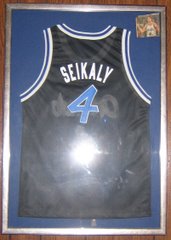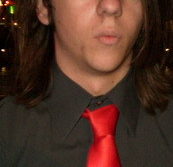
Until LeBron "King" James ascended to the throne in 2003, Kevin Garnett had been the face of high schoolers making the jump straight to the Association. He knows a thing or two about success: Garnett is a ten-time NBA All-Star, a Most Valuable Player award-winner, and a seven-time All-NBA team selection. However, his team has not fared as well. Since losing in the Western Conference Finals to the L.A. Lakers in 2004, the Minnesota Timberwolves have not even made the postseason and have a won-lost record of 108-130 (.453). In other words, Garnett is an island.
What does the Garnett/Timberwolves paradox of success mean for the Magic? Well, lots of things, especially if your name is Dwight Howard. Like Garnett, Howard is a 6'11" forward/center who entered the league straight out of high school and who was expected to pull his team from the depths of mediocrity.
After his team defeated the Magic on Sunday, Garnett was asked about Howard and what Howard's future might hold. Here's how Ticket responded, as reported by The Orlando Sentinel:
We're going to see now just what type of player Dwight wants to be, and where he sees himself in this league. He's going to have to do his homework. He's going to have to evolve his game. I know what it's like to deal with double teams. Being a dominant player, you have to figure how to break them. He [Howard] has to have other aspects of his game to go to. There are ways to make others around you better. He has to attack defenses differently.Dwight should probably take that advice to heart. Although Garnett is certainly one of the most dominant players in the league today, he didn't start out that way; in his first season, he averaged just 10.3 points per game and 6.3 rebounds per game. Howard's first-year numbers are actually better than Garnett's: 12.0 points per game and 10.0 rebounds per game. So is Howard the next Garnett? Well, probably not, because their skill sets are so different. But look at KG's fourth-season averages: 20.8 points per game and 10.4 rebounds per game. Not bad for a 22-year-old.
Next season will be Dwight Howard's fourth in the NBA. It's time for him to blossom and to prove to the Magic organization and its fans that he's worth every penny of the $87.5 M contract extension he will sign this summer. The most impressive thing Howard could do to truly earn that money is to develop a go-to low-post move; at present, Howard's offensive game consists of grabbing offensive rebounds and putting them into the basket with a thunderous dunk. How dependent upon that skill is Howard? To date, 222 of his 470 field goals this season have come on dunks - that's a startlingly high 47.2%. Although it's true that not all of those dunks came as a direct result of an offensive rebound, it's also true that evolved post players have a variety of weapons at their disposal: a hook shot, an up-and-under move, a drop step, et cetera. In other words, truly exceptional big men can do more than dunk the ball.
But more important than offensive development is overall team success. In Garnett's breakout fourth season, which happened to be shortened to 50 games due to the player lockout, the Timberwolves went 25-25 for a .500 winning percentage; the Magic have yet to reach .500 with Howard. In other words, even if he realizes his full offensive potential, Dwight Howard will not truly be elite until he proves that he can carry a team.
Understand that I'm not trying to take anything away from Dwight. He's certainly the best center in the East, even better than Shaquille O'Neal, who started the All-Star game in front of Howard due to receiving the highest number of fan votes at his position. He's also among the top three centers in the NBA, just behind Yao Ming and neck-and-neck with Amaré Stoudemire. Basically, he's already one of the best in the league, and he hasn't even scratched the proverbial surface.

... or slapped the proverbial backboard, if you prefer.
But the Garnett comparison doesn't end there. Consider the Timberwolves' recent futility and the lack of an adequate supporting cast, and it's easy to see why some are speculating that Garnett will exercise the opt-out clause in his contract at the end of next season or that the Timberwolves will trade him to avoid losing him to free agency. Here's an excerpt from an ESPN.com interview with Garnett posted earlier today:
Q: So if you or the Wolves choose not to pursue a trade this summer, do you think we'll still see some major changes with this franchise?
A: There's got to be. F--- yeah. I think [head coach] Randy Wittman would echo that, so it's not just me.
Hmm, a franchise player who is sick of not having talented teammates and of languishing on a bad team? Sadly, it could be the future for Howard, although he hasn't hinted that he's interested in leaving Orlando.
The message is simple: Dwight Howard needs to develop in the way Kevin Garnett did, but the Magic organization needs to avoid developing in the way the Timberwolves did. But the Magic should already know better, right? After all, it knows what it's like to lose a franchise player for nothing.
 May history never repeat itself. In Seikaly's name we pray.
May history never repeat itself. In Seikaly's name we pray.AMEN.
UPDATE - Thanks to my good buddy Spike for creating the Vitruvian Man image at the top of this post. I really appreciate it.




No comments:
Post a Comment